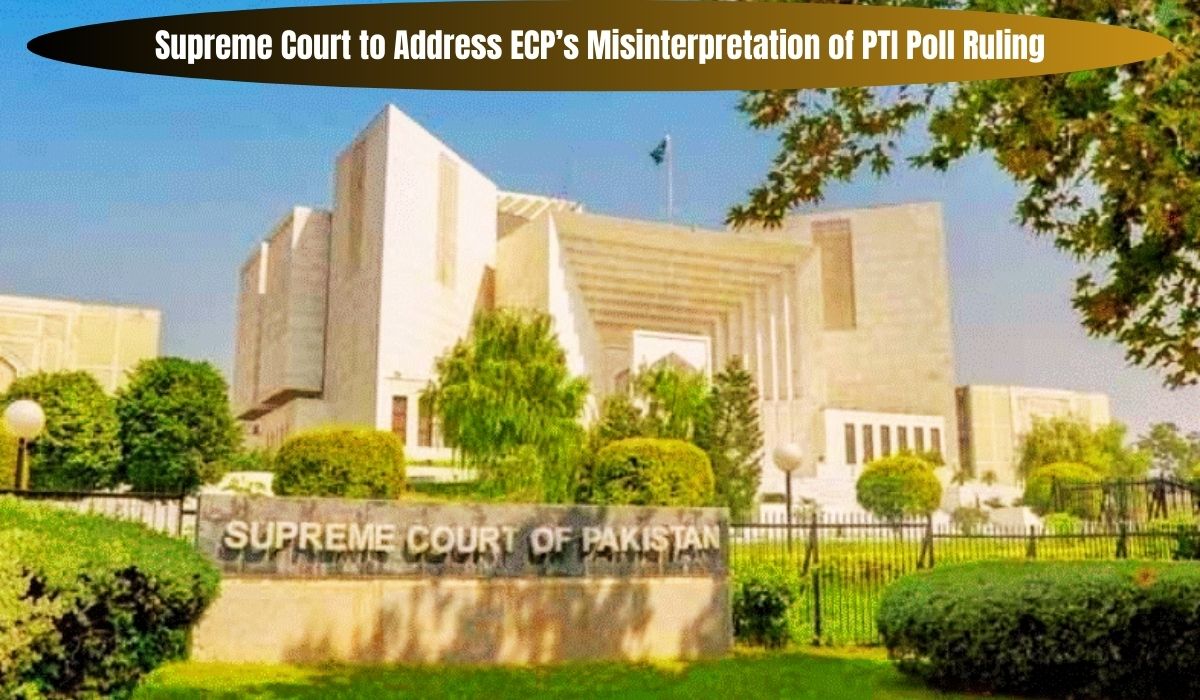Supreme Court to Address ECP’s Misinterpretation of PTI Poll Ruling!

Overview
The Supreme Court of Pakistan is currently reviewing the Election Commission of Pakistan’s (ECP) interpretation of a previous court ruling related to the Pakistan Tehreek-e-Insaf (PTI) party’s intra-party elections. The justices have expressed concerns over the ECP’s handling of the ruling, suggesting that the Supreme Court is responsible for correcting any missteps made by the electoral body.
Background of the Case
ECP’s Interpretation of the Supreme Court Ruling
- Supreme Court’s Verdict: The Supreme Court ruled regarding PTI’s intra-party elections.
- ECP’s Response: The ECP interpreted this ruling and made decisions affecting the allocation of reserved seats for PTI.
Issues Raised by the Supreme Court
- Justice Ather Minallah: Highlighted that the ECP misinterpreted the ruling and questioned if the Supreme Court should rectify the ECP’s mistake.
- Justice Munib Akhtar: Noted that political parties are essential for parliamentary democracy and criticized the ECP’s error, which led to numerous independent candidates returning as MNAs.
Arguments Presented
Misinterpretation and Its Consequences
- Justice Mansoor Ali Shah: Stressed that the court cannot ignore its duty to pursue justice, even if it means correcting its own previous mistakes.
- Justice Ayesha Malik: Emphasized that the problem arose from the ECP’s incorrect interpretation of the Supreme Court’s verdict.
Role of Political Parties
- Justice Munib Akhtar: Explained that political parties form the backbone of parliamentary democracy and the ECP’s error affected the formation of the parliamentary party by the independents.
Attorney General’s Arguments
Allocation of Reserved Seats
- Eligibility: Only political parties, not independents, can secure reserved seats according to the Constitution.
- Parliamentary Party Formation: A parliamentary party is formed after the oath-taking by elected members.
Article 187 and Supreme Court Authority
- Application: Article 187 can only be applied to cases currently under trial and does not permit starting new proceedings.
- Historical Context: Cited various court verdicts to argue that the SC can invoke its authority when necessary.
Chief Justice’s Remarks
Justice and Law
- Chief Justice Qazi Faez Isa: Stressed the need for true justice based on the law and the Constitution.
- Doctrine of Necessity: Criticized historical justifications for martial law, suggesting the need for adherence to constitutional principles.
Points of Contention
Contradictions in ECP’s Actions
- Justice Munib Akhtar: Pointed out the contradiction in the ECP’s refusal to accept SIC as a political party while issuing a notification of its parliamentary party.
- Notification Status: The court questioned the legal basis for the ECP’s notification regarding SIC.
Next Steps
Court’s Responsibility
- Correcting Mistakes: The Supreme Court is deliberating on whether it should rectify the ECP’s misinterpretation to uphold justice and maintain democratic integrity.
Adjournment
- Next Hearing: The court has adjourned the case, and the next hearing is scheduled for the following Tuesday, with consensus from all involved parties.
Conclusion
The Supreme Court is actively addressing the issue of the ECP’s misinterpretation of its ruling on PTI’s intra-party elections. The justices have expressed a commitment to correcting any mistakes to ensure justice and the proper functioning of the parliamentary system. The ongoing case highlights the importance of accurate interpretation of court rulings and the role of judicial oversight in maintaining democratic processes.
Sources
- Supreme Court of Pakistan
- Election Commission of Pakistan (ECP)
- Pakistan Tehreek-e-Insaf (PTI)
- Justice Ather Minallah
- Justice Munib Akhtar
- Justice Mansoor Ali Shah
- Justice Ayesha Malik
- Chief Justice Qazi Faez Isa



One thought on “Supreme Court to Address ECP’s Misinterpretation of PTI Poll Ruling!”